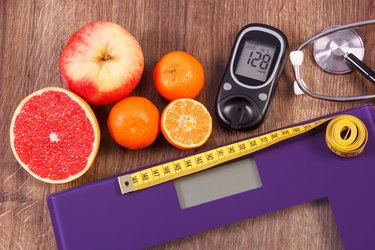
Enthusiasm — and skepticism — about the benefits of intermittent fasting is nothing new. Whether the eating pattern works well for people with diabetes is also an ongoing debate.
Below, experts weigh in on the pros and cons of intermittent fasting (IF) for type 2 diabetes and offer tips on how to do IF safely.
Video of the Day
Video of the Day
First, What Is Intermittent Fasting?
Before we dive into the pros and cons of IF for diabetes, it's worth defining the dietary pattern.
"Intermittent fasting is an umbrella term for several [dietary] approaches that include fasting," says Amy Rothberg, MD, a clinical professor of internal medicine in the Division of Metabolism, Endocrinology and Diabetes (MEND) and director of the MEND Weight Management Clinic at Michigan Medicine.
Each approach is a little different:
- Time-restricted feeding: This method limits eating to a certain window during the day. That may look like eating within an eight-hour window (for example: 10 a.m. to 6 p.m.) and then restricting food for the remaining 16 hours of the day, a common approach called 16:8 fasting. This tends to be the most popular — and most researched — form of IF.
- Alternate-day fasting: This approach calls for a day of either complete fasting or significantly restricted intake followed by a day of "normal" eating, Dr. Rothberg says. A take on this is the 5:2 diet, which consists of five days of regular eating each week and two (non-consecutive) days when people eat about 500 calories or fewer.
Pros of Intermittent Fasting for Type 2 Diabetes
There's a long list of purported health benefits of IF, from improved cellular repair to increased antioxidant defenses, per December 2019 research in The New England Journal of Medicine.
And that's not all. "Studies in rodents report that time-restricted feeding reduces body weight, improves glycemic control, lowers insulin levels, reduces blood pressure, prevents hyperlipidemia, decreases hepatic fat, improves inflammatory markers, slows tumor growth and increases lifespan, even when [caloric] intake is matched to a control group," Dr. Rothberg says.
Exactly how IF affects health outcomes in people, though — and particularly those diagnosed with type 2 diabetes — is slightly less clear. Here are some potential advantages:
1. It Might Support Weight Management
According to the American Diabetes Association, moderate loss of about 5 percent of total body weight in people with a high BMI is linked to improvements in metabolic risk factors. For people with diabetes looking to shed weight, intermittent fasting can seem like a solid means of achieving this goal.
But whether IF is any better at producing weight loss than simply restricting calories remains unclear. That is, IF and caloric-restriction interventions resulted in similar weight loss outcomes when matched calorie for calorie, per a September 2022 systematic review in the Journal of the Academy of Nutrition and Dietetics.
"When the two eating patterns have been compared, intermittent fasting is no more effective than a moderate calorie restriction for weight management," says Molly Chanzis, RD, CDCES, a registered dietitian, certified diabetes care educator and specialist at Culina Health. "Different methods will work better for different people, so it's important to keep in mind which eating pattern, if either, is best for your lifestyle."
2. It May Improve Insulin Sensitivity
Perform a quick search online and you'll find evidence that IF improves insulin sensitivity, or how responsive our cells are to the blood sugar-lowering hormone insulin.
Research suggests time-restricted feeding may improve both insulin sensitivity and pancreatic beta cell function in men with prediabetes, even without weight loss, per a small June 2018 study in Cell Metabolism. Like most of the research on this topic, though, this study was of short duration.
(Here at LIVESTRONG.com, we try to avoid language that implies a sex or gender binary. Here, though, we've included the term "men" because that is the language used by the study authors.)
A February 2021 review in Clinical Diabetes and Endocrinology also highlighted findings that intermittent fasting regimens resulted in significantly greater reductions in biomarkers like fasting insulin and HOMA-IR (a measure of insulin resistance) when compared to caloric restriction, though the study was not conducted in people diagnosed with diabetes.
So, while IF seems to improve insulin sensitivity, it's just one of many interventions that may benefit people with diabetes.
"At this stage, given the small studies of relatively short duration, time-restricted feeding should not be the only approach to improving insulin sensitivity," Dr. Rothberg says. "Time-restricted feeding can be implemented in those with insulin resistance as part of a more comprehensive plan of reducing overall calories [if needed], getting enough physical activity and sleep, and managing other risk factors."
Cons of Intermittent Fasting for Type 2 Diabetes
Intermittent fasting is not risk-free — and its potential drawbacks can be even more serious for people with diabetes.
1. It May Lead to Hypoglycemia — and Require Medication Modifications
"Fasting can lead to low blood sugar in some cases because it means an extended period of time with no fuel coming into our bloodstream," Chanzis says.
Diabetes medications like insulin and sulfonylureas work by lowering blood sugar levels. If intermittent fasting is done along with these meds, it's possible that blood sugar levels will drop too low, resulting in hypoglycemia.
"Alternate-day fasting may complicate insulin regimens for those taking insulin, as they would need a lot less [insulin] on the days they fast and may need more [insulin] on the days they consume food," Dr. Rothberg says.
"It is easier to adjust insulin for people on an insulin pump, where basal settings can be adjusted hourly," says Nina Sundaram, MD, a board-certified endocrinologist and the founder of Aura Endocrinology. "For patients [who are intermittent fasting and] taking daily basal injections, I would closely monitor for hypoglycemia and the need to decrease the basal insulin dose."
If you're managing your diabetes with medication, be sure to speak to your physician before starting an IF regimen, as your meds may need to be adjusted to prevent dangerous dips in blood sugar during fasting periods.
2. It Could Also Cause Hyperglycemia
Picture this: You've gone way too long without a meal and all you want is quick fuel. Pizza. Bagels. A big bowl of pasta. We've all been there. A need for simple carbs is the body's natural response to being in a low-blood-sugar state, which we now know can follow a prolonged period of fasting or undereating.
"Going too long without eating can understandably make us really hungry," Chanzis says. "If we're absolutely starving when we break the fast, we're probably going to be more likely to reach for very energy-dense foods like sugar and refined carbs."
The problem? Simple carbs tend to send blood sugar levels sky-high and rapid spikes in glucose can lead to complications over time in people with diabetes.
If you find yourself carb-loading after fasting periods, this meal pattern may not help you stabilize your blood sugars after all.
3. It Could Hurt Your Hydration Status
People taking a certain class of medications called sodium glucose co-transporters for diabetes management "can get into trouble with dehydration rather quickly, as these drugs can deplete the body of salt and water," Dr. Rothberg says.
Though rare, these meds coupled with fewer opportunities to eat hydrating foods like fruits and vegetables could potentially increase the risk of dehydration in people with diabetes.
This possible risk is more likely on an alternate-day fasting plan that severely limits, or completely bans, food a few days per week compared to a time-restricted feeding approach.
4. It May Lead to Nutrient Deficiencies Over Time
"Long-term intermittent fasting can contribute to risk of malnutrition and nutrient deficiencies because when you shorten the period of time in the day in which you allow yourself to eat, you may be limiting the amount of nutrients you're getting," says Diana Mesa, RD, CDCES, a registered dietitian, certified diabetes care and education specialist and the founder of En La Mesa Nutrition.
Of course, "This can also happen with long-term calorie restriction," Mesa clarifies.
If you're starting an intermittent fasting program, work with a registered dietitian to ensure you're still getting all the vitamins and minerals you need.
5. It’s Not Sustainable for Everyone
Spoiler alert: Intermittent fasting plans aren't exactly easy to follow. Take the Cell Metabolism study that reported improved insulin sensitivity in people trying time-restricted feeding, for example. The trial imposed a six-hour eating window, with study participants finishing dinner by 3 p.m. daily. While we're all for an early bird special, there's no denying that most people aren't down for a dinner reservation at 2:30 in the afternoon.
Before hopping on the IF train, consider whether the eating pattern is even feasible for you and your lifestyle. There's little benefit in following a meal plan that will only stick for a few weeks.
Tip
Any diet that restricts energy intake or enforces food rules is not recommended for people struggling with eating disorders or disordered eating patterns. Do not try intermittent fasting if you struggle with your relationship to food.
How to Do IF Safely When You Have Diabetes
1. Pick the Right Approach
The safety of IF with type 2 diabetes depends partly on your chosen approach.
"As opposed to alternate-day fasting, time-restricted feeding is relatively safe," Dr. Rothberg says. "I don't perceive much of a problem from reducing intake from 12 hours to eight hours per day."
That said, "The longer the fasting window, the more considerations there are, so try to find the window that you're able to sustain without erratic blood sugar swings, cravings or energy crashes," Chanzis says. "A shorter fasting window may be more realistic for many people."
2. Ease Into It
If you're prone to all-day eating and late-night snacking, start with a moderate 12-hour fast, eating breakfast around 8 a.m. and finishing dinner by 8 p.m. Closing down the kitchen a few hours before bed is helpful not only for blood sugar stability, but also improved sleep quality and digestion.
From there, you may experiment with shorter daily eating windows. Just be sure to do so with supervision from your health care provider.
3. Talk to Your Doctor
"It's important to talk with one's doctor first and create a plan together that is sustainable," Dr. Rothberg says, particularly for people taking diabetes medications.
- Journal of the Academy of Nutrition and Dietetics: “The Effects of Isocaloric Intermittent Fasting vs Daily Caloric Restriction on Weight Loss and Metabolic Risk Factors for Noncommunicable Chronic Diseases: A Systematic Review of Randomized Controlled or Comparative Trials”
- Cell Metabolism: “Early Time-Restricted Feeding Improves Insulin Sensitivity, Blood Pressure, and Oxidative Stress Even Without Weight Loss in Men with Prediabetes”
- Clinical Diabetes and Endocrinology: “Intermittent Fasting: Is There a Role in the Treatment of Diabetes? A Review of the Literature and Guide for Primary Care Physicians”
- The New England Journal of Medicine: “Effects of Intermittent Fasting on Health, Aging, and Disease”
- Diabetes Spectrum: “Weight Management: Obesity to Diabetes”
Is this an emergency? If you are experiencing serious medical symptoms, please see the National Library of Medicine’s list of signs you need emergency medical attention or call 911.


